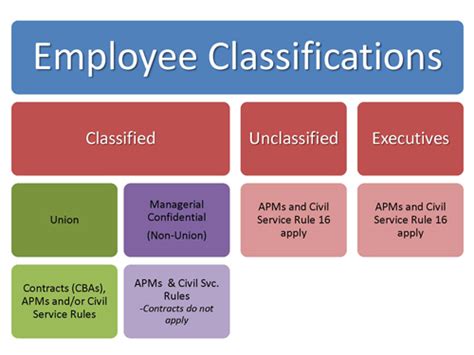Employee Classification Types Compared (7 Types)

When it comes to classifying employees, there are several different types that organizations use. Each type carries its own set of benefits and responsibilities. Understanding these classifications can help both employers and employees navigate the complexities of the working relationship. In this article, we will compare and contrast seven different employee classification types and explore their unique characteristics.
1. Full-Time Employees
Full-time employees are individuals who work a standard number of hours per week, typically 35 to 40 hours. They are considered permanent employees and are entitled to all the benefits and rights provided by the organization, such as health insurance, paid time off, and retirement plans.
2. Part-Time Employees
Part-time employees work fewer hours than full-time employees, usually less than 35 hours per week. They may have a fixed schedule or work on a flexible basis. Part-time employees often receive prorated benefits based on the number of hours worked, but the specific benefits can vary depending on the organization’s policies.
3. Temporary Employees
Temporary employees, also known as contingent workers, are hired for a specific period of time or project. They are not considered permanent employees and may be employed directly by the organization or through a staffing agency. Temporary employees do not typically receive benefits and their employment can be terminated once the project or time period ends.
4. Independent Contractors
Independent contractors are self-employed individuals who provide services to an organization on a contract basis. They are not considered employees and are responsible for paying their own taxes and providing their own benefits. Independent contractors have more control over their work and are often hired for specialized projects or expertise.
5. Interns
Interns are individuals who work for an organization to gain practical experience in a specific field. They are typically students or recent graduates and may work on a full-time or part-time basis. Internships can be paid or unpaid, depending on the organization’s policies and legal requirements.
6. Seasonal Employees
Seasonal employees are hired to meet the temporary demands of a specific season or event. They are often employed in industries such as retail, hospitality, and agriculture. Seasonal employees may work full-time or part-time and are entitled to certain benefits based on their hours worked and the organization’s policies.
7. Consultants
Consultants are experts in a particular field who provide specialized advice and services to organizations. They are not considered employees and are typically hired on a project basis. Consultants have a high level of autonomy and are responsible for managing their own business and clients.
Conclusion
Understanding the different types of employee classifications is essential for both employers and employees. Each classification carries its own set of rights, benefits, and responsibilities. By knowing the distinctions, employers can ensure compliance with labor laws and provide appropriate compensation and benefits. Employees can also have a better understanding of their rights and responsibilities within the organization.
Frequently Asked Questions
- Q: Do part-time employees receive benefits?
- A: Part-time employees may receive prorated benefits based on the number of hours worked, but it depends on the organization’s policies.
- Q: Are interns always unpaid?
- A: Internships can be paid or unpaid, depending on the organization’s policies and legal requirements.
- Q: Do temporary employees have job security?
- A: Temporary employees are hired for a specific period or project and their employment can be terminated once it ends.
- Q: What is the difference between an employee and an independent contractor?
- A: Employees are hired directly by the organization and are entitled to benefits, while independent contractors are self-employed and responsible for their own taxes and benefits.
- Q: Can seasonal employees work full-time?
- A: Seasonal employees can work either full-time or part-time, depending on the organization’s needs.
- Q: How do consultants differ from employees?
- A: Consultants are not considered employees and are hired on a project basis to provide specialized advice and services.
